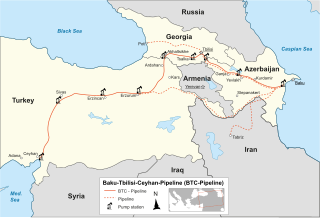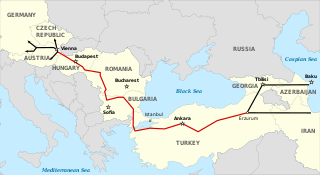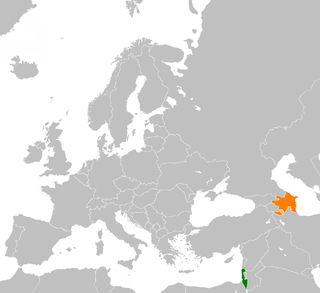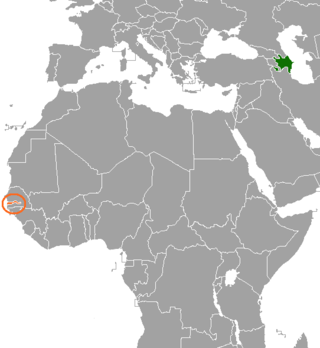
The Baku–Tbilisi–Ceyhan (BTC) pipeline is a 1,768 kilometres (1,099 mi) long crude oil pipeline from the Azeri–Chirag–Gunashli oil field in the Caspian Sea to the Mediterranean Sea. It connects Baku, the capital of Azerbaijan and Ceyhan, a port on the south-eastern Mediterranean coast of Turkey, via Tbilisi, the capital of Georgia. It is the second-longest oil pipeline in the former Soviet Union, after the Druzhba pipeline. The first oil that was pumped from the Baku end of the pipeline reached Ceyhan on 28 May 2006.

Clayland Boyden Gray is an American lawyer and former diplomat who served as White House Counsel from 1989 to 1993 and as U.S. Ambassador to the European Union from 2006 to 2007. He is a founding partner of the Washington, D.C.-based law firm Boyden Gray & Associates LLP.

The Nabucco pipeline was a failed natural gas pipeline project from Erzurum, Turkey to Baumgarten an der March, Austria to diversify natural gas suppliers and delivery routes for Europe. The pipeline was to lessen European dependence on Russian energy. The project was backed by several European Union states and the United States and was seen as rival to the Gazprom-Eni South Stream pipeline project. The main supplier was to be Iraq with potential supplies from Azerbaijan, Turkmenistan, and Egypt.

Matthew James Bryza is a former United States diplomat. His last post in the United States foreign service was the United States Ambassador to Azerbaijan.
Azeri–Chirag–Gunashli or Azeri–Chirag–Deepwater Gunashli is a complex of oil fields in the Caspian Sea, about 120 kilometres (75 mi) off the coast of Azerbaijan. It consists of the Azeri and Chirag oil fields, and the deepwater portion of the Gunashli oil field. An overall estimate of the area of the development is 432.4 square kilometres (167.0 sq mi). It is developed by the Azerbaijan International Operating Company, a consortium of international oil companies, and operated by BP on behalf of the consortium. The ACG fields have estimated recoverable reserves of about 5 to 6 billion barrels of petroleum. Peak oil production of 835,000 barrels per day (132,800 m3/d) was reached in 2010, however by the first quarter of 2022 production had declined to 434,000 barrels per day (69,000 m3/d), or about one-half of peak value. As of 2021, ACG oil accounted for 95% of all Azerbaijani oil exports.

The South Caucasus Pipeline is a natural gas pipeline from the Shah Deniz gas field in the Azerbaijan sector of the Caspian Sea to Turkey. It runs parallel to the Baku–Tbilisi–Ceyhan pipeline (oil).

The Trans-Caspian Gas Pipeline is a proposed subsea pipeline between Türkmenbaşy in Turkmenistan, and Baku in Azerbaijan. According to some proposals it would also include a connection between the Tengiz Field in Kazakhstan, and Türkmenbaşy. The Trans-Caspian Gas Pipeline project would transport natural gas from Turkmenistan and Kazakhstan to European Union member countries, circumventing both Russia and Iran. It would do this by feeding the Southern Gas Corridor. This project attracts significant interest since it would connect vast Turkmen gas resources to major consumers Turkey and Europe.

Relations have always been strong between Azerbaijan and Turkey, and are often described as "one nation, two states" by the ex-president of Azerbaijan Heydar Aliyev due to both being Turkic countries.

BOTAŞ Petroleum Pipeline Corporation (BOTAS) is the state-owned crude oil and natural gas pipelines and trading company in Turkey. The company was established in 1974 as a subsidiary of TPAO. Since 1995, BOTAS is a wholly state-owned company.

Azerbaijan and Israel have engaged in close cooperation since 1992. Azerbaijan is one of the majority Muslim countries, alongside Turkey, Egypt, Bahrain, United Arab Emirates, Jordan, Sudan, Kosovo, Morocco, Albania, Gulf countries and the other former Soviet republics to develop bilateral strategic and economic relations with Israel. In President Ilham Aliyev's meeting with Israel Prime Minister Benjamin Netanyahu, Aliyev praised the active role of the Jewish community living in Azerbaijan in developing bilateral relations between the countries.

According to the 2012 U.S. Global Leadership Report, 53% of Azerbaijanis approve of U.S. leadership, with 27% disapproving and 21% uncertain.

The Republic of Azerbaijan and the European Union (EU) have maintained a positive relationship through the years and have become more closely linked since 1991. Azerbaijan is currently part of the European Neighborhood Policy, the Eastern Partnership and the Council of Europe. The EU is the largest foreign grant donor to and investor in Azerbaijan, both in the government sector and civil society, making available over 600 million EURO of bilateral EU assistance since 1992.

Foreign relations exist between Azerbaijan and Romania. The countries have established embassies in their respective capitals. The Azeri president visited Romania in October 2004 and the two nations have signed over fifty separate agreements to date.

Richard L. Morningstar is the former United States Ambassador to Azerbaijan. He was formerly Special Envoy of the United States Secretary of State for Eurasian Energy. Currently, Ambassador Morningstar is the founding director and chairman of the Global Energy Center at the Atlantic Council. He also serves as a senior advisor at Albright Stonebridge Group, a global business strategy firm.
The Mozdok–Makhachkala–Kazi Magomed pipeline is a natural gas pipeline from Mozdok in North Ossetia through Chechnya and Dagestan to Azerbaijan. The Azerbaijani section is also known as the Kazi Magomed–Novo Filya or Baku–Novo Filya, and it connects Baku with the Novo Filya gas metering utility on the Russian side of the Azerbaijan-Russia border. The pipeline will be used for transportation of Azerbaijani gas to Russia starting from 1 January 2010.
Azeri is an offshore oil field in the Caspian Sea, located 100 km (62 mi) east of Baku, Azerbaijan and is a part of the larger Azeri-Chirag-Guneshli (ACG) project. The Azeri field includes Central Azeri, West Azeri, East Azeri production platforms compression and water injection platform (C&WP). The field was discovered in 1988 and originally it was named after 26 Baku Commissars.
Bahar is an offshore oil and gas field in the Caspian Sea, located 40 km (25 mi) southeast of Baku, Azerbaijan. The field was discovered in 1968 and was first developed in 1969. Prior to 2010, it produced approximately 16.8 million tonnes of oil and 128.7 billion cubic meters of gas. There had been up to 93 wells operating in the field during the peak of production; the number has since decreased to 16.
Gum Deniz is an offshore oil and gas field in the Caspian Sea, located 21 km (13 mi) southeast of Baku, Azerbaijan. The field has been in operation since 1955. Gum Deniz has produced approximately 28.9 million tonnes of oil and 27 billion cubic meters of gas to date. In March 2009, Azerbaijan drilled its last well No. 478 in Gum Deniz field before new production sharing agreement for development of the field was signed with a foreign company in December 2009. The well produces 50 tonnes of oil on daily basis.

Amos J. Hochstein is a U.S. businessman, diplomat, and lobbyist. Currently the Special Presidential Coordinator for Global Infrastructure and Energy Security under US President Joe Biden, he has worked in the U.S. Congress, has testified before congressional panels and has served in the Barack Obama administration under Secretaries of State Clinton and Kerry. He was appointed Deputy Assistant Secretary of State in 2011 and as Special Envoy and Coordinator for International Energy Affairs. In 2015, President Barack Obama nominated Hochstein to be the Assistant Secretary of State for Energy Resources but the Senate did not act on the nomination.

Azerbaijan–Gambia relations are the bilateral relations between Azerbaijan and The Gambia. Neither country has a resident ambassador.















